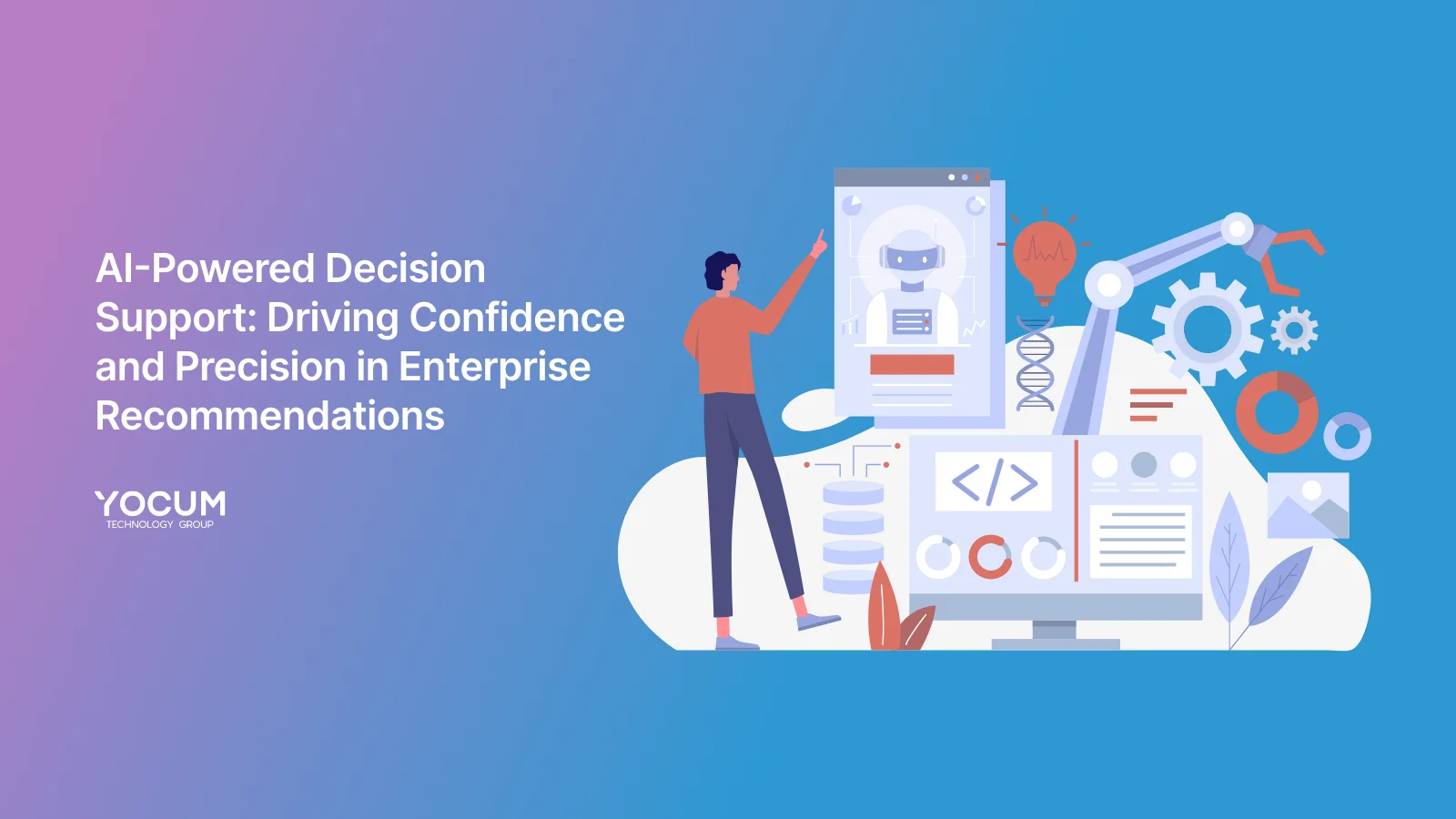AI-Powered Decision Support: Driving Confidence and Precision in Enterprise Recommendations
Key Takeaways
- Improved Decision Accuracy: AI consolidates multiple data sources for context-aware, precise recommendations.
- Personalized Scaling: Adaptive AI applications enable tailored insights across large ecosystems.
- Continuous Refinement: Feedback loops enhance relevance and accuracy over time.

This article explores how AI transforms enterprise recommendations, the key pillars of effective implementation, and strategies for ensuring responsible AI use.
Why AI-Powered Decision Support Is a Game Changer
- Enhanced Decision Accuracy: AI analyzes vast, multimodal datasets to deliver precise recommendations tailored to business needs. For example, enterprises can use AI to streamline supply chain decisions or improve customer segmentation.
- Real-Time Adaptability: Unlike static systems, AI learns and evolves with real-time user feedback, allowing enterprises to stay agile in changing market conditions. For instance, retailers can adjust pricing strategies dynamically based on customer behavior trends.
- Trust and Transparency: Trustworthy AI systems prioritize transparency and compliance. By ensuring users understand how recommendations are generated, businesses can build confidence in AI-driven decisions.
Key Pillars of Effective AI Recommendations
For AI-powered recommendations to deliver value, they must align with these foundational principles:
- Accuracy and Reliability: High-quality data and advanced algorithms ensure dependable recommendations. For example, predictive models in healthcare require rigorous testing to ensure patient safety.
- Adaptability: AI must respond to changing user needs and contexts. A media streaming service might use real-time sentiment analysis to recommend trending content.
- Feedback Loops: Continuous input from users allows AI systems to refine and improve over time. This is critical for industries like e-commerce, where preferences shift rapidly.
- Cross-Ecosystem Integration: Breaking down silos ensures seamless sharing of insights across departments, fostering cohesive decision-making.
Building Scalable Enterprise Recommendation Strategies
Creating scalable AI solutions requires thoughtful planning. Here are three steps to maximize impact:
Unify Data Sources
Fragmented data limits decision-making potential. AI-powered systems consolidate data into cohesive frameworks, allowing businesses to gain a 360-degree view of operations.
Scale Personalization
Adaptive AI applications tailor recommendations for individual users while maintaining scalability. For example, a global retailer can deliver personalized product recommendations to millions of customers simultaneously.
Leverage Real-Time Insights
Predictive analytics provide actionable insights in dynamic environments. Businesses can use these insights to pivot strategies quickly, staying competitive in evolving markets.

The Role of Feedback Loops in AI Recommendations
Feedback loops are essential to keeping AI recommendations relevant and effective. These loops collect and analyze user interactions, enabling AI systems to adapt and align with evolving business objectives.
For example:
- In online retail, feedback from customer purchases can refine product recommendations.
- In B2B, user feedback on report accuracy can improve data visualizations and analysis tools.
Ensuring Ethical and Responsible AI Use
Ethical AI practices are non-negotiable for sustainable adoption. To build trust and meet regulatory standards, enterprises should:
- Prioritize Transparency: Explain how algorithms generate recommendations.
- Respect Privacy: Use anonymized data to safeguard user information.
- Ensure Fairness: Avoid biases in recommendations by diversifying training datasets.
By committing to these principles, businesses can foster user confidence while driving innovation.
How to Get Started with AI-Powered Decision Support
Adopting AI-powered systems doesn’t have to be overwhelming. Start with these steps:
Modernize Legacy Systems
Transform outdated infrastructure into AI-ready environments.
Embrace Cloud Scalability
Migrate to the cloud for high-performance AI deployments and cost efficiency.
Clean and Organize Data
Structured, actionable data is essential for AI decision support to deliver accurate results.
Need help getting started? Explore our services to unlock the potential of AI for your enterprise.
Ready to Elevate Your Decision-Making Strategy?
Discover how AI-powered decision support can revolutionize your recommendations. Contact us today to learn how we can help you harness intelligent, actionable insights.



